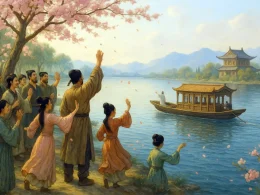Say not downhill ends hardship's domain,
It tricks travelers with joy's false gain.
Once caught in peaks that circle like a chain,
One slope frees you—the next blocks the plain.
Original Poem
「过松源晨炊漆公店」
杨万里
莫言下岭便无难,赚得行人错喜欢。
政入万山围子里,一山放出一山拦。
Interpretation
Composed during the Chunxi era of the Southern Song Dynasty. In the late 12th century, amidst fluctuations in his official career and inner turmoil, Yang Wanli often traveled through Jiangxi and Hunan provinces. During his journeys, he frequently incorporated observations and reflections from hiking, crossing rivers, and lodging into his poetry. This work, "Passing Songyuan, Morning Meal at Qi's Inn," was written during his travels through Songyuan (present-day Anren, Jiangxi), capturing impressions from a chance encounter with a mountain inn. Through depicting the arduous and winding mountain paths, the poet conveys profound insights on the human condition: worldly affairs are like climbing mountains—whether ascending or descending, difficulties and obstacles never truly disappear.
First Couplet: "莫言下岭便无难,赚得行人错喜欢。"
Mò yán xià lǐng biàn wú nán, zhuàn dé xíngrén cuò xǐhuān.
Do not say that descending the ridge is without difficulty; this notion often earns travelers misplaced joy.
The poet begins with direct commentary, immediately challenging conventional perception. He points out that descending may not necessarily be easier than ascending—a reminder drawn from life experience. The character "错" (cuò, misplaced) vividly captures the psychological letdown of travelers, eloquently expressing the disappointment that arises from underestimating challenges.
Second Couplet: "政入万山围子里,一山放出一山拦。"
Zhèng rù wàn shān wéi zǐ lǐ, yī shān fàng chū yī shān lán.
Just as you enter the encircling fold of countless mountains, one mountain releases you only for another to block your way.
The poet personifies the mountain ridges vividly, as if they intentionally alternate between "releasing" and "blocking" the traveler. This imagery not only portrays the winding and perilous mountain path but also reflects the twists and trials of life's journey, carrying profound philosophical implications.
Holistic Appreciation
Though only four lines, this poem is clearly layered and deeply meaningful. The first two lines offer commentary, introducing the difficulty of the mountain path and the traveler's misconception through "misplaced joy." The latter two lines shift to scenery, vividly depicting the continuous obstruction of mountain ranges. The interplay of discourse and description embeds philosophy within concrete imagery, making the reading enlightening.
The poem conveys not only the physical experience of mountain climbing but also reflections on life. People often assume "descending is easy," yet reality proves otherwise—new obstacles always lie ahead. Such twists and turns are both a true portrayal of natural landscapes and a metaphorical representation of life's path. With a light and natural tone, the poet expresses a universal yet profound truth, offering awakening insight without obscurity.
Artistic Merits
- Direct and forceful opening with discourse: The line "Do not say that descending the ridge is without difficulty" strikes like a wake-up call, shattering conventional assumptions and immediately engaging readers in reflection.
- Refined diction with vivid expressiveness: The character "赚" (zhuàn, earns) carries a teasing nuance while vividly conveying the traveler's sense of being deceived and let down.
- Skillful use of personification: "One mountain releases you only for another to block your way" endows the mountains with personality, as if they intentionally engage with the traveler, enlivening the imagery.
- Philosophy embedded in scenery: Surface descriptions of climbing hardships subtly convey life lessons. The fusion of scene and reason lends substantial depth to these four brief lines.
- Concise and natural language: The poem uses no obscure terms; its colloquial expression carries profound philosophy, making it accessible yet endlessly evocative.
Insights
This poem reminds us that life's path is never smooth; even when a stage seems like "descending" successfully, new difficulties and obstacles will continue to arise. Do not let momentary ease foster "misplaced joy"; instead, maintain clarity and preparedness to continually meet new challenges. Through the metaphor of mountain climbing, the poet reflects on life's philosophy, reminding us that only by persevering through difficulties can we journey farther across life's endless ridges.
About the Poet

Yang Wanli (杨万里 1127 - 1206), a native of Jishui in Jiangxi, was a renowned poet of the Southern Song Dynasty, celebrated as one of the "Four Great Masters of the Restoration" alongside Lu You, Fan Chengda, and You Mao. He attained the jinshi degree in 1154 and rose to the position of Academician of the Baomo Pavilion. Breaking free from the constraints of the Jiangxi School of Poetry, he pioneered the lively and natural "Chengzhai Style," advocating for learning from nature and employing plain yet profound language. His poetry, often drawing inspiration from everyday life, profoundly influenced later schools of lyrical expression, particularly the Xingling (Spirit and Sensibility) School.












